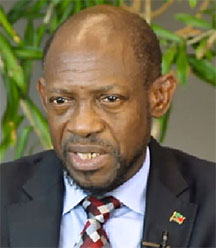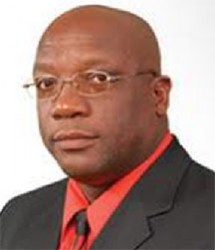In a day of high drama, St. Kitts and Nevis Prime Minister Denzil Douglas was voted out of office with his former minister Timothy Harris leading an opposition coalition to victory.
Harris led an alliance of three opposition parties to victory, denying Douglas a fifth consecutive term in power. The Associated Press (AP) reported yesterday that the result came on a day of confusion over the delay in the release of the preliminary results by the Director of Elections and in the backdrop of months of political manoeuvring over a motion of no-confidence that the opposition was trying to bring against the government.
The AP reported that Douglas conceded defeat late yesterday extending his congratulations to the Team Unity coalition led by Harris, a former minister in his Cabinet. “I wish our newly elected government well,” said Douglas, who had been prime minister since 1995.

Harris, the prime minister-elect for his bloc as it begins a five-year term, called it a “great day” for the twin-island country.
Final results from Monday’s election were still pending, but the Team Unity alliance said it won at least seven of the 11 seats in Parliament. The report noted that Elections Supervisor Wingrove George was widely criticized earlier in the day after he suspended reporting of partial results.
The Organization of Eastern Caribbean States and other observers called for ballot counting to be expedited. Political leaders from other regional nations said George’s office needed to hurry up and deliver the results, which had been expected early in the day since St. Kitts and Nevis has only about 36,000 registered voters.
Recall
AP said that George had told state-owned radio and TV station ZIZ that some candidates were contesting preliminary results, slowing an official announcement from his office. “We don’t want to hurriedly make decisions and determinations that we can’t recall,” George was quoted as saying.

CARICOM had earlier issued a statement expressing concern. Chairman of the regional grouping Prime Minister Perry Christie of The Bahamas said that in a preliminary report to the CARICOM Secretary-General, the Chief of the CARICOM Electoral Observation Mission stated that the process was generally orderly, despite some challenges.
“CARICOM is therefore extremely concerned that the Supervisor of Elections has not yet officially declared the results of the preliminary count. The Caribbean Community calls on the Supervisor of the Elections to do so without further delay. The time-honoured practice in St. Kitts and Nevis has been to release the preliminary results of elections within hours of the close of the polls. The non-release of the preliminary results is therefore unacceptable and creates a climate of uncertainty,” he said.
“I call on all concerned to fulfill their obligations in the electoral process, to respect the will of the people of St. Kitts and Nevis and to ensure that the democratic traditions of our Caribbean Community are upheld,” he added.
Trinidad PM Kamla Persad-Bissessar had also said that her government was concerned at the delay in releasing results. “We respect the independence of all lawful institutions in St. Kitts and Nevis, but at the same time we feel that the failure of the Supervisor of Elections to declare the results in a timely manner might create the impression that there is interference in the democratic process, which we in the Caribbean Community cherish,” she said according to a report in the Trinidad Express.
“I am also concerned that the region’s reputation for democracy and for free and fair elections will be under threat as long as this issue in St Kitts and Nevis remains unresolved,” the Prime Minister said. She added that in any event, the law does not generally allow the suspension of any part of the process until the respective returning officers return the writs.
“It is the return of the writs that allows the public and the Governor General to know definitively what is the will of the people. As a region we have to be very careful of the messages that we send and that which is emanating from St. Kitts and Nevis is not the kind of message we want to send to our people and to the world. We await the results of the vote and would welcome whoever is the winner,” she said.
Frightening
Grenada Prime Minister Dr Keith Mitchell also expressed concern, a report in the Jamaica Observer said. “From what I understood is happening is that the supervisor stopped counting votes in certain constituencies and this is rather frightening,” he said. “Therefore my own position and speaking on behalf of the government and people of Grenada…is that I am calling on the supervisor of elections to declare the results of the elections as the people expect…the people have voted, let the mandate of the people prevail and that’s the way I see it,” he added.
The Observer reported Mitchell as saying that Grenada does not want to interfere with the internal politics of St Kitts but he feels the pain for what the people are going through, adding that the development in St Kitts-Nevis has implications for the entire Caribbean.
No-confidence motions
Douglas had faced two no-confidence motions. The first was submitted two years ago but never came up for debate in Parliament because it was stalled since legal proceedings were filed in the courts. In October last year, a second no-confidence motion was filed against Douglas’ administration.
On January 16, Douglas announced that he had advised the Governor General to dissolve the Parliament with immediate effect. This was after an emergency sitting which saw the passage of a resolution giving way for Governor-General Sir Edmund Lawrence to sign a Proclamation which would in effect revise Electoral Boundaries whenever Parliament is dissolved.
However, the revised electoral boundaries proved controversial. Douglas’ administration introduced the electoral constituencies by proclamation on 16 January, exactly a month before the scheduled vote. The opposition, however, claimed the proclamation was not correctly gazetted, the UK Guardian reported. The opposition had also said the new boundaries would also give government candidates an unfair advantage, and they launched a legal challenge. Local courts dismissed their appeals.
However, the UK Privy Council struck down the new electoral regulations last week. Five British justices sitting on the judicial committee of the Privy Council in London overturned the introduction of fresh constituency boundaries ahead of the Monday poll. As a result, the elections were held using the old electoral boundaries.
The privy council’s ruling declared: “It is determined and ordered that the list to be used in the … election is and shall be that existing prior to the proclamation …. purportedly issued and published by the governor general. Any effect which the said proclamation would continue otherwise to have, whether in relation to any other election or otherwise, is hereby suspended until further order.”
Douglas was aiming to become the first regional leader to win five consecutive general elections. Both parties had fielded 11 candidates each.





